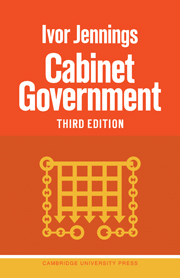Book contents
- Frontmatter
- Contents
- PREFACE
- CHAPTER I THE BRITISH CONSTITUTION
- CHAPTER II THE CHOICE OF A PRIME MINISTER
- CHAPTER III THE FORMATION OF A GOVERNMENT
- CHAPTER IV THE ADMINISTRATION
- CHAPTER V MINISTERS AT WORK
- CHAPTER VI INTER-DEPARTMENTAL RELATIONS
- CHAPTER VII TREASURY CONTROL
- CHAPTER VIII THE PRIME MINISTER
- CHAPTER IX THE CABINET
- CHAPTER X WAR AND DEFENCE
- CHAPTER XI ECONOMIC POLICY
- CHAPTER XII CONSTITUTIONAL MONARCHY
- CHAPTER XIII THE PERSONAL PREROGATIVES: DISMISSAL OF MINISTERS, DISSOLUTION OF PARLIAMENT, CREATION OF PEERS
- CHAPTER XIV PATRONAGE AND HONOURS
- CHAPTER XV GOVERNMENT AND PARLIAMENT
- APPENDIX I. GOVERNMENTS SINCE 1835
- APPENDIX II. EXAMPLES OF GOVERNMENTS
- APPENDIX III. THE PREROGATIVE OF DISSOLUTION
- APPENDIX IV. BIOGRAPHICAL AND BIBLIOGRAPHICAL NOTES
- INDEX
APPENDIX III. THE PREROGATIVE OF DISSOLUTION
Published online by Cambridge University Press: 23 September 2009
- Frontmatter
- Contents
- PREFACE
- CHAPTER I THE BRITISH CONSTITUTION
- CHAPTER II THE CHOICE OF A PRIME MINISTER
- CHAPTER III THE FORMATION OF A GOVERNMENT
- CHAPTER IV THE ADMINISTRATION
- CHAPTER V MINISTERS AT WORK
- CHAPTER VI INTER-DEPARTMENTAL RELATIONS
- CHAPTER VII TREASURY CONTROL
- CHAPTER VIII THE PRIME MINISTER
- CHAPTER IX THE CABINET
- CHAPTER X WAR AND DEFENCE
- CHAPTER XI ECONOMIC POLICY
- CHAPTER XII CONSTITUTIONAL MONARCHY
- CHAPTER XIII THE PERSONAL PREROGATIVES: DISMISSAL OF MINISTERS, DISSOLUTION OF PARLIAMENT, CREATION OF PEERS
- CHAPTER XIV PATRONAGE AND HONOURS
- CHAPTER XV GOVERNMENT AND PARLIAMENT
- APPENDIX I. GOVERNMENTS SINCE 1835
- APPENDIX II. EXAMPLES OF GOVERNMENTS
- APPENDIX III. THE PREROGATIVE OF DISSOLUTION
- APPENDIX IV. BIOGRAPHICAL AND BIBLIOGRAPHICAL NOTES
- INDEX
Summary
DISCUSSIONS ON THE HOME RULE BILL, 1913
The following material is taken from The Times for September 1913. The Home Rule Bill had been passed by the House of Commons in two successive Sessions and rejected by the House of Lords in each of those Sessions. The discussions below took place before the beginning of the third Session, during which the Home Rule Bill became law under the Parliament Act, 1911.
Mr George Cave to The Times
The passage of the Home Rule Bill in its present form means the division of the kingdom, the impoverishment of Ireland, the use of British troops to dragoon a part of that country into submission to a new authority, the probability of that most bitter and lamentable of all forms of conflict—civil war. It must profoundly affect the future of Great Britain as well as of every part of Ireland. Is it so foolish to suggest that, before action such as this is taken in the name of the people of England and Scotland, they should be asked whether they assent to it or not? I confess that, founding myself on my estimate of the character of the Prime Minister and some of his colleagues rather than on any spoken word, I have hitherto inclined to the belief that before making themselves answerable to the country and to history for consequences so tremendous they would themselves desire to have the plain sanction of a direct popular vote.
- Type
- Chapter
- Information
- Cabinet Government , pp. 539 - 545Publisher: Cambridge University PressPrint publication year: 1959



